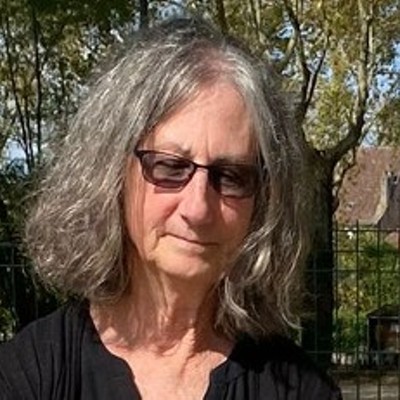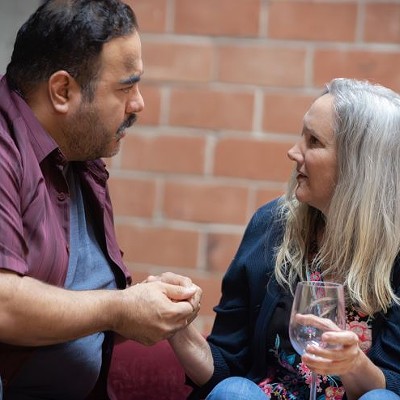Actress Hallie Foote may have been born in New York City, but with her father's roots "so deeply Southern," she says, "I feel that's part of me as well." On Wednesday's opening-night production of Dividing the Estate at the Alley Theatre, she'll once again be appearing in one of the plays written by her late father, Horton Foote.
Based in the fictional town of Harrison (think Wharton), Texas and set in 1987, Dividing the Estate tells the story of the Gordon family as its various generations decide whether to stick together or split apart in the face of financial disaster. It's considered one of Horton Foote's funniest plays.
At the same time, while she's in town, Foote is working on the possibility of setting up a foundation in Wharton County to honor her father's legacy. His papers are at SMU, but she'd like to set up a writers' retreat at one of the two houses in Wharton the family still owns. "We're still kind of in the thinking-it-through process. I would love to tie it in to Texas universities and colleges and also sort of foster writers that are coming up in the ranks and also theaters," she told Art Attack.
"When my Mom passed away in '92, we started spending a lot of time in Wharton, which is where he has a house. We have the house now. So I feel very connected to this place," she said. In fact, the entire cast took a trip to Wharton to get a better idea of the small town that Foote used as template for much of his work.
Horton Foote won the Pulitzer Prize for Drama for Young Man From Atlanta and two Academy Awards for his screenplays for To Kill a Mockingbird and Tender Mercies. Despite these honors, Hallie Foote, who'll be re-creating her Tony-nominated role as Mary Jo in Dividing the Estate, believes his work has been undervalued, and she's been campaigning hard to change that.
"I think he's starting to emerge. I think he's one of the great writers of the 20th century. I think he's slowly getting more and more recognition. That's part of the reason I want this foundation to move forward. Certainly he's one of the great Texas writers, playwrights. I think what's interesting about my father is he was able to write plays and write movies, even television, and did it all very well."
He clearly loved the theater best, though, she said. "There's a lot of downtime in filmmaking. It's not a collaborative medium. But in theater the writer is sort of held way up high. I just think my father felt in more control in the theater. There's something magical about it because you'll never see that particular performance again with that particular audience."
His plays were deeply spiritual as well, she said. Horton Foote and his wife were both Christian Scientists. "They really used their religion on a daily basis," Hallie Foote said. "I think his plays, there's a spiritual component that you can't deny. I've always felt there was something kind of mystical about my father's plays and to me that's spiritual. There's an unknown thing that happens and sort of takes over."
Michael Wilson, who directed the Broadway/Lincoln Center production of Dividing the Estate as well as Horton Foote's nine-hour The Orphans' Home Cycle at the Signature Theatre in New York, will be handling the Alley production as well.
"I think he's kind of a genius," said Hallie Foote about Wilson. "My father always said no one has the theatrical sense like Michael does. He really understands the theater and what's required to bring something to life. He has an infectious love of theater, and it's hard not to be attracted to that kind of a person. He loves actors and I think he really loves directing, and he really loves my father, so it doesn't hurt to have somebody, such an advocate."
She'd like to see Orphans Cycle brought to the Alley -- Artistic Director Gregory Boyd is a fan -- but acknowledges the hurdles of play length and expense with the 22 actors called for in it.
The last time she performed in that play, "I was playing my great-great-grandmother on my grandfather's side, and I was the mother of his father who died when she was very, very young. And then I played a character that was kind of an alcoholic who married the brother of the man who I end up playing the wife to later on, my great-grandmother. So I end up playing my great-great-grandmother, my great-grandmother, and then this woman who sort of fits in on the maternal side. Then I play a cousin that's plopped in the middle of the third part. I felt a little schizophrenic. But it was fine."
Actually, she said, while her father drew heavily on his own family background, his characters are composites -- not verbatim recreations of his relatives. Although there's a legendary -- and true -- story about his first play that not only used the name of Wharton in it but identified the real girls in town who were drunk at a dance. Following a considerable outcry, he never made that mistake again, she said.
In fact, she said, there are some Horton Foote plays still waiting in the wings, that "just can't be done for a while" because of people who are still living.
Elizabeth Ashley, who plays matriarch Stella Gordon in Dividing, is well known for her work by another American playwright to whom Foote is often compared -- Tennessee Williams.
"Tennessee, there's a way he writes, it's kind of a poetic style, a lyrical style. My father is more sort of grounded in reality and story and characters," Hallie Foote said. "They both have an emotional impact, but they come at it different ways and I think you get hit different ways. Tennessee's language is more flowery, my father's is more straight-ahead and simple, but they're equally beautiful. And I think that they both arrive at the same place."
Dividing the Estate runs through October 30 on the Hubbard Stage of the Alley Theatre, 615 Texas Avenue. For ticket information, go to www.alleytheatre.org or call 713-220-5700.
Thanks to Professor Jim Price in the Texas State University-San Marcos Theater Department for help with Art Attack's questions for this interview.






